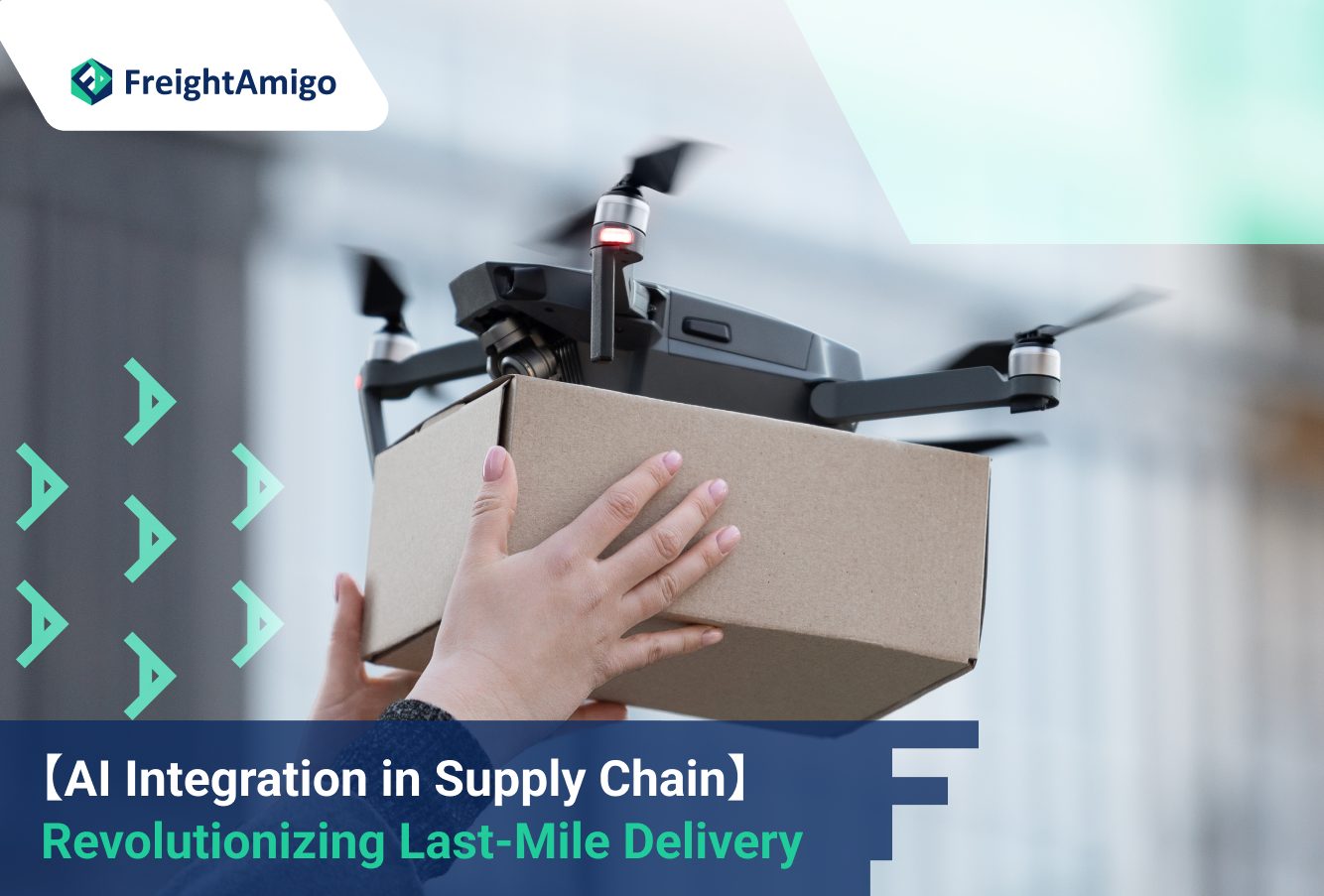January 16th, 2024: Maya Wong – Marketing Analyst at FreightAmigo
The logistics industry is undergoing a significant transformation with the integration of Artificial Intelligence (AI) into supply chain operations. AI is revolutionizing the last-mile delivery process, addressing the challenges posed by surging consumer demand, rising costs, labor shortages, and the need for guaranteed service times. By leveraging AI technology, businesses can unlock numerous opportunities for optimization, efficiency, and improved customer experiences. In this article, we will explore the various ways in which AI is transforming the last-mile delivery landscape and revolutionizing the logistics industry.
Want To Compare The Best Express, Air Freight, Sea Freight, Rail Freight & Trucking Rates So As To Have Better Control On Cost?
The Growing Significance of Last-Mile Delivery
Last-mile delivery, the final leg of the delivery process from a distribution center to the end consumer, has become increasingly crucial in recent years. The exponential growth of e-commerce, changing consumer expectations, and the need for efficient, timely deliveries have significantly elevated the importance of last-mile logistics. Today’s consumers demand shorter delivery times, live tracking, and seamless experiences, putting immense pressure on providers to innovate and optimize their last-mile operations.
AI’s Transformative Capabilities in Last-Mile Logistics
Artificial Intelligence offers transformative capabilities to overcome the complexities and challenges of last-mile logistics. By leveraging AI, providers can optimize delivery routes, allocate resources effectively, predict demand patterns, enhance customer experiences, and minimize environmental impact, among other things. While AI is already shaping the last-mile logistics industry today, the next five years are expected to bring even more revolutionary changes.
Autonomous Vehicles: Redefining Last-Mile Delivery
One of the most noticeable changes in last-mile delivery will be the increasing presence of autonomous vehicles. Autonomous vehicles, including self-driving cars and drones, have the potential to revolutionize the delivery process. According to McKinsey, passenger vehicles in Europe and North America will be capable of self-driving on highways by 2025. This advancement in AI technology will undoubtedly impact the logistics industry, enabling faster, more cost-effective deliveries while minimizing carbon emissions.
Autonomous vehicles powered by AI can efficiently navigate urban environments, optimize routes in real-time, and ensure safe and reliable deliveries. These vehicles can operate round-the-clock, increasing efficiency and customer satisfaction by providing faster and more convenient delivery options. The global market for autonomous vehicles, including drones, is projected to grow exponentially, further driving the transformation of last-mile delivery.
Delivery Drones: Reshaping Last-Mile Logistics
Delivery drones are another AI-powered innovation that is set to reshape last-mile logistics. Companies like Amazon, Walgreens, and UPS have already tested and implemented drone delivery services. The COVID-19 pandemic has further accelerated the need for contactless deliveries, making drone delivery an increasingly competitive market. With advancements in battery technology, drones are capable of carrying larger payloads over longer distances, making them viable for last-mile deliveries in both urban and remote areas.
Delivery drones offer several advantages in last-mile delivery, including faster delivery times by bypassing traffic congestion and providing more direct routes to destinations. AI systems enable efficient airspace management, package recognition, and obstacle avoidance, ensuring seamless and secure deliveries. The integration of AI and drones in last-mile logistics is expected to bring significant improvements in delivery speed, efficiency, and overall customer satisfaction.
Robotic Warehousing and Sorting: Streamlining Logistics Operations
Logistics giants like Amazon and FedEx have already integrated advanced robotic warehousing and sorting systems into their operations. These AI-powered robots automate the storing, organizing, and sorting of packages within distribution centers. With further advancements in AI technology, these robots will collaborate seamlessly with human workers, optimizing warehouse operations, and enhancing order fulfillment speed.
Intelligent robotic systems equipped with AI capabilities can efficiently navigate warehouses, retrieve and shelve items, and optimize storage space. This innovation improves order accuracy, reduces errors, and streamlines logistics operations. While robotic warehousing and sorting may not be strictly considered part of the last mile, it has significant implications for last-mile logistics. As these technologies continue to prove their value, the adoption of warehouse robotics is expected to double in the next five years.
3D Printing and On-Demand Manufacturing: Enhancing Efficiency and Personalization
AI is also expected to impact 3D printing and on-demand manufacturing in last-mile logistics. AI algorithms can analyze real-time demand data and trigger the production of specific items locally, closer to the end customers. This decentralized manufacturing approach reduces reliance on centralized production facilities and long-distance transportation, resulting in faster delivery times and reduced carbon footprints.
Predictive models powered by AI can consider various factors such as customer behavior, seasonal trends, and external events to anticipate demand spikes and allocate resources accordingly. This optimization of production schedules, materials usage, and quality control enables efficient on-demand manufacturing and delivery of personalized products or spare parts. AI-driven 3D printing and on-demand manufacturing will bring significant advancements in supply chain efficiency and customer satisfaction.
Cognitive Robotics: Enabling Complex Last-Mile Deliveries
Cognitive robotics presents exciting opportunities for handling complex last-mile deliveries. Equipped with advanced AI and natural language processing capabilities, cognitive robots can navigate intricate environments like apartment buildings and office spaces to make deliveries to specific individuals or locations. These robots can interact directly with customers, follow voice commands, and adapt to dynamic situations, enabling secure and personalized deliveries across diverse settings and complex scenarios.
Advancements in deep learning have enabled significant progress in cognitive robotics, with the market expected to grow rapidly in the next few years. The integration of AI and cognitive robotics in last-mile logistics will enhance delivery efficiency, accuracy, and customer experiences.
Preparing for the AI-Powered Future of Last-Mile Delivery
While AI is already shaping the last-mile delivery landscape, its widespread implementation and scalability in the logistics industry will take time due to regulatory, infrastructural, and operational challenges. Organizations operating in the last-mile logistics sector must take proactive steps to prepare for the AI-powered future.
- Assess Operational Models: Evaluate current operational models to identify areas where implementing AI technologies can optimize logistics processes. Determine which technologies align with specific objectives and can deliver the most significant benefits.
- Explore Integration Feasibility: Investigate the feasibility of integrating AI technologies into existing infrastructure. This may involve conducting pilot programs, partnering with technology providers, or establishing in-house labs to test and refine AI solutions.
- Upskill Workforce: Prioritize upskilling and reskilling the workforce to ensure they can effectively operate and manage AI systems. Initiatives focusing on developing the necessary technical skills and knowledge will be crucial for success in the AI-powered future of last-mile delivery.
By taking these measures, organizations can position themselves to gain a competitive edge in the evolving market landscape. While the future of last-mile logistics remains uncertain, it is clear that AI integration will continue to revolutionize the industry. The advancements brought about by AI-powered technologies will drive efficiency, optimize resources, and enhance the overall customer experience. Embracing AI in the supply chain is the key to unlocking the full potential of last-mile delivery in the years to come.
There Are Different Options For Cargo Transportation. If You Want To Choose The Most Convenient And Suitable Solution, It Is Best To Have The Full Support Of Logistics Experts! If You Are Planning To Ship Goods Overseas, Please Go To The FreightAmigo Page For Inquiries.
===
Read More:
【AI Integration in Supply Chain】 Revolutionizing Supplier Relationship Management
【Innovative Technologies】 The Role of AI Integration in Supply Chain Management
【Leveraging Smart Warehouse Inventory】 A New Era of Inventory Control
===
If you have any inquiries on logistics/supply chain, feel free to contact FreightAmigo now:
Hotline: +852 28121686
WhatsApp: +852 27467829









































